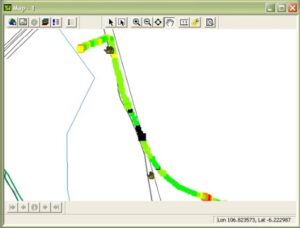Mobile RF and TEMS Investigation Workshop
5 DAYS
INSTRUCTOR LED WORKSHOP
“OUR COURSES CAN BE SPECIALLY TAILORED TO ADDRESS YOUR REQUIREMENT – TELECONTRAN”

COURSE OBJECTIVES
With the expansion of 4G / LTE Network, Consumers expect powerful network performance and seamless experiences across all mobile platforms – leaving service operators to face competitive environments with several challenges.
Network performance monitoring and benchmarking is one of the key objectives for telecom regulators and operators. This 5-day course serves as a landmark for the professionals looking to enhance their skills in the performance, QoS and Benchmarking of Mobile Networks along with the usage of TEMS Optimizing tool.
After successful completion of this workshop, participants will be able to
- Understand the Parameters involved in Network Monitoring and Optimization and the necessary KPI Metrics.
- Monitor end-to-end Mobile Network performance across complex architectures.
- Assist the engineering team in planning and performance management
- Deliver dashboards, reports, and alerts with speed at scale.
- Understand RAN Optimization Principles and related technologies that can be used to deliver value to customers
- Ensure that LTE/4G customers are satisfied with speed, performance, and their overall mobile experience.
- Learn how to use TEMS in consistent network testing, monitoring, analysis and competitive benchmarking over complete lifecycle of rollout and optimization.
- Understand how to effectively optimize and troubleshoot all RAN technologies and services using TEMS.
COURSE CURRICULUM
This program is designed for Network Performance and QoS Professionals, RF Planning and Optimization Engineers, Performance Monitoring Engineers, Technical Managers, Regulatory and Enforcement Engineers and Managers.

Mobile Network Introduction
- Mobile Network Overview
- GSM to GPRS
- Overview of 3GPP Releases
- UMTS / WCDMA and HSPA / HSPA+
- LTE and LTE Advanced
- Migration Path towards LTE/4G
RF Propagation
- Radio Propagation Environment
- Frequency Division
- Channel models
- Frequency selective channels
- Time dependant radio channels
- Multipath radio conditions- Delay, Doppler Spectrum, Multi-Antenna channel model
- Macrocell / Microcell propagation model
- Modulation Principles
RF optimization principles and procedures
- Design, analysis and optimization of wireless networks
- Verification of network deployments for 2G / 3G / 4G wireless networks
- RF engineering principals
- Ensure good quality network and services
- Optimize the use of Network Planning Resources
- Expand the coverage more quickly
- Link Budgets, Scheduling and Resource Allocation to support Site Acquisition.
- Preparation and Report generation
- Detect and correct adjacent and co-channel interference
- Determine actual uplink coverage
- Produce real-time coverage maps
- True-up RF modeling software
- Propagation Analysis
- Role of Antenna in RF optimization
Basic RF operations and the configurable parameters
- Evaluate call-processing operations
- Perform selected call processing functions
- Measure and report the amplitude of the received base station signal
- Measure and report the signal quality of the received base station signal
- Read and report the neighbor cell list from the broadcast messages
- Report the amplitude of neighbor list base stations
- View and log protocol messages in decoded form for easy interpretation
- RF coverage and service performance measurements for 2G/2.5G/3G network optimization
- System Setting
- Initial optimization testing of installed networks
- Antenna and Transmission Line Considerations
- System field-testing and parameter optimization
- Functional testing and optimization for implemented sites
- Test plan development
- System drive test and data analysis
- System parameter settings and interference control
Key Network Performance Counters
- Network Performance Assessment
- Network Coverage
- Cell Capacity
- Call Quality
- Call quality analysis, using customer complaints, statistical data, and drive test data
- Parameters Tuning
RF Optimization KPIs
- Determine the exact causes of dropped calls, high BER/FER, and missed hand-offs
- FER, Mobile Receive Power, Ec/Io, Mobile Transmit Power
- System accessibility analysis
- Available radio resources and network trunking issues
- System parameter optimization
- Regression analysis to measure benefits
- Frequency/PN offset planning
- Self-generated system interference
- Cell site integration
- Construction coordination
- Equipment installation/antenna system verification
- RF Parameter Data Fills
Performance-Monitoring tools
- Network Evaluation and Performance Enhancement
- Drive Testing and Tools used for Drive Testing
- Key Traffic Statistics including CSSR / CDR / HOSR / CBR and their Formulas and Measuring methods
Real-Life Drive-Text Example Cases to be solved in class
Real-World Optimization Issues and Solutions
Introduction of TEMS Investigation
- General functionalities of TEMS Investigation
- Different licensing solutions available
- Different devices used in TEMS Investigation
Software Installation and Recommended Settings
- Install TEMS Investigation.
- Understand the license update process.
- Review your license contents.
- Run TEMS Investigation
TEMS Investigation User Interface
- Understand the user modes of TEMS Investigation.
- Describe the TEMS Investigation user interface
Connecting Equipment
- Activate/Deactivate equipment in TEMS Investigation.
- Manually run services and apply control functions.
- View and modify certain properties of devices
Collecting and Analyzing Data
- Types of Drive Testing using TEMS
- Drive Testing Guidelines
Reports and Exports
- Reporting Guidelines
- Layer 3 Messages
- Scanning Functions inside TEMS
Optimization Case Study using TEMS
OUR HAPPY CLIENTS
WHAT OUR CLIENTS SAY ABOUT TELECONTRAN !!
The course was thorough and covering all aspect in the technical environment which are from engineering, IT and also the basic background of the telco industry.
This course has given me more insight on 5G network as a whole, from introduction to Smart Cities. The presentation was well outlined and learning objectives were successfully completed.
Excellent introductory course presented by an excellent instructor who was so engaging and supportive that I did not hesitate to ask questions; His answers and presentation was great and understandable.
The trainer explained LTE, LTE cell planning and 5G technologies in extremely interesting manner and I must say that the discussion during the workshop was simply excellent.


